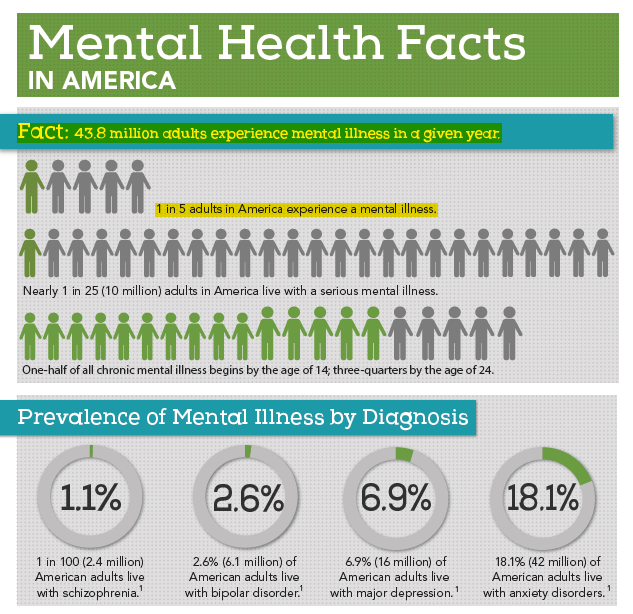Support
You are Not AloneSupport
Facts:
- One in five people, or 20% of the US population, will suffer from a mental health disorder sometime in their lives.
- Only 50% of those affected by mental illness will ever seek treatment.
Although you may feel like there is no place to turn, you are in a safe place. We can help bear the weight of your journey and provide support for you and your loved ones.
If you or a loved one is currently experiencing a mental health episode, you are in the right place. Here, you will find information and resources to help lead you to recovery. Although you may feel like there is no place to turn, this is a safe place to land and you are not alone.
If you are currently experiencing a mental health problem, even if you’re not sure what it is exactly, there are professionals that want to help you. If you are currently employed, ask Human Resources if there is an Employee Assistance Program. If not, seek out community resources.
Unsure Where to Start? Here are some things to consider when reaching out:
- If it’s an emergency in which you or someone you know is suicidal, you should immediately call the National Suicide Prevention Lifeline at 1-800-273-8255, call 911 or go to a hospital emergency room.
- If you can wait a few days, make an appointment with your primary healthcare provider or pediatrician if you think your condition is mild to moderate.
- If your symptoms are moderate to severe, make an appointment with a specialized doctor such as a psychiatrist. You may need to contact your community mental health center or primary health care provider for a referral.
- If you or your child is in school or at college, contact the school and ask about their support services.
- Seek out support groups in your community and educate yourself about your symptoms and diagnosis. Social support and knowledge can be valuable tools for coping.
Click to download
Therapy for All
Get access to confidential therapy with a licensed clinician via app and web. Use code “myparachute” to get $100 off your first month.
Friends and family members can be important influences to help someone get treatment and start feeling better. Here are some things you can do to help a loved one:
- Reach out and let them know you are available to help
- Help them access mental health services (but don’t force them)
- Learn and share the facts of mental health, especially myths you hear that aren’t true
- Treat every person with respect and normalcy
- Refuse to define them or their challenges using labels such as “crazy”
- Remember that denial from someone experiencing a mental health episode can be normal – do not give up!
How to talk or approach a family or friend with a possible mental health disorder
Suggestions on how you may approach someone living with a mental health condition:
- Talk to them in a space that is comfortable, where you won’t likely be interrupted and where there are likely minimal distractions.
- Ease into the conversation, gradually. It may be that the person is not in a place to talk, and that is OK. Greeting them and extending a gentle kindness can go a long way. Sometimes less is more.
- Be sure to speak in a relaxed and calm manner.
- Communicate in a straightforward manner and stick to one topic at a time.
- Be respectful, compassionate and empathetic to their feelings by engaging in reflective listening, such as “I hear that you are having a bad day today. Yes, some days are certainly more challenging than others. I understand.”
- Instead of directing the conversation at them with ‘you’ statements, use ‘I’ statements instead.
- Be a good listener, be responsive and make eye contact with a caring approach.
- Ask them appropriate questions and avoid prying.
- Give them the opportunity to talk and open up but don’t press.
- Share some easy insights as a way of encouraging easy conversation, such as comments about the weather, the community or other.
- Reduce any defensiveness by sharing your feelings and looking for common ground.
- Speak at a level appropriate to their age and development level. Keep in mind that mental illness has nothing to do with a person’s intelligence.
- Be aware of a person becoming upset or confused by your conversation with them.
- Show respect and understanding for how they describe and interpret their symptoms.
- Genuinely express your concern.
- Offer your support and connect them to help if you feel that they need it. Ask, “How can I help?” if appropriate, or even, “Can I pray with you now?” if appropriate.
- Give the person hope for recovery, offer encouragement and prayers.
Things to Avoid Saying:
- “Just pray about it.”
- “You just need to change you’re attitude.”
- “Stop harping on the negative, you should just start living.”
- “Everyone feels that way sometimes.”
- “You have the same illness as my (whoever).”
- “Yes, we all feel a little crazy now and then.”
Things to Avoid Doing:
- Criticizing blaming or raising your voice at them.
- Talking too much, too rapidly, too loudly. Silence and pauses are ok.
- Showing any form of hostility towards them.
- Assuming things about them or their situation.
- Being sarcastic or making jokes about their condition.
- Patronizing them or saying anything condescending.
Sometimes mental health issues are disguised by addictive behaviors. If you or a loved one is experiencing trouble with drugs, alcohol, gambling, self-harm, disordered eating, or other dangerous behaviors, consider following the same advice above for help and engage professional resources.
“Although the world is full of suffering, it is also full of the overcoming of it.”
Therapy for All
Get access to confidential therapy with a licensed clinician via app and web. Use code “myparachute” to get $100 off your first month.


